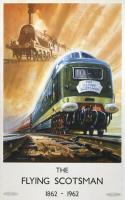 Add My Company
Add My Company
Sign In
The Flying Scotsman
18-08-2014

Here in Great Britain, we have the oldest railway system in the world; since 1825, when George Stephenson’s Locomotion first took passengers on the Stockton and Darlington Railway, we’ve had a long tradition of pioneering lines and famous services.
Fs_centOne such famous service, The Flying Scotsman, has run since 1862. It was originally called the Special Scotch Express, and ran both ways from King’s Cross station in London to Waverley station in Edinburgh, linking the two capitals via the East Coast route. The journey in those days was, of course, steam-powered, and took ten and a half hours, including a stop at York for lunch.
However, with rising competition from the West Coast route, and a number of informal but widely reported speed races between East and West, speeds increased, stops were reduced and the journey time came down to a mere eight and a half hours. In order to defuse the rivalry between the two routes, an agreement restricted them to an eight hour, fifteen minute journey time until 1932, even though technology improved to the point that a non-stop journey could be made from 1928 onwards.
In 1924, the service was officially renamed to The Flying Scotsman, the name which it had informally held since the 1870s, and it ran with a wide range of luxury services on board – including a barber’s shop!
The next big change for The Flying Scotsman came in 1962, when the famous steam locomotives were replaced by Deltic diesel engines. This, of course, required a big change in the way that the train was fuelled. Gone were the days of coal and water; instead the locomotives needed fuelling with 900 imperial gallons of diesel fuel to reach full capacity.
In the 1950s, British Rail committed to dieselisation and converted quickly; the later move to electrification wasn’t so completely embraced, so diesel still fuels a considerable proportion of the British railway network today. The East Coast Railway Company – who still run The Flying Scotsman today – use around £100,000 of diesel per day, which adds up to around £36 million a year. At these quantities, an error of just 1% would mean that £360,000 pounds worth of fuel went unaccounted for, so naturally they rely on high quality fuel management systems to keep their usage on track. The systems which we here at Fueltek provided them with allow them to increase efficiency through better practice, and can realistically achieve accountability savings of 2%.
Whatever volume of fuel you need for your fleet, accountability is a prime factor in ensuring that you’re running to the best possible efficiency and making the most of your money. Here at Fueltek, we specialise in providing the right management, reporting and monitoring systems to help keep your overheads down and your profitability up. For more information, contact us on 01254 291391.
For more information on The Flying Scotsman talk to Fueltek Ltd
Enquire Now
List your company on FindTheNeedle.

